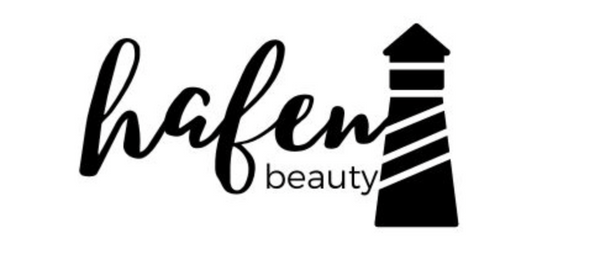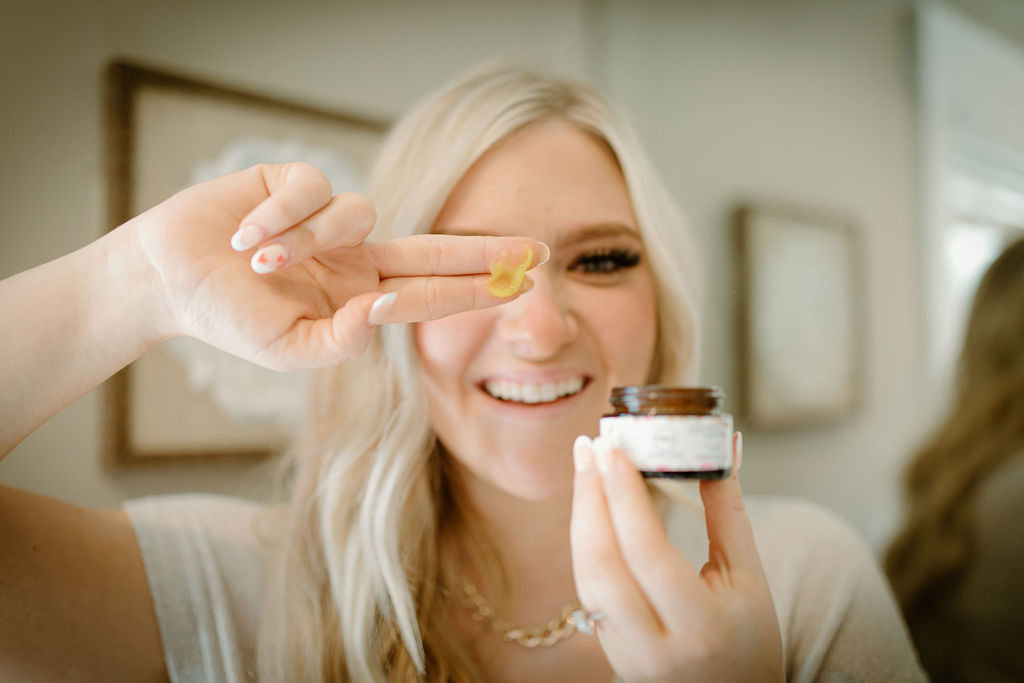WHAT IS RETINOL?
Retinol is a chemical derivative of vitamin A. Vitamin A is a well-known nutrient that supports skin, eye, reproductive health, and the immune system. When retinol is entered into the body, it converts naturally into retinal and retinoic acid, which is how the body benefits from them. When Vitamin A enters the bloodstream, it converts into retinol>retinal>retinoic acid. Our skin uses Vitamin A to rebuild cells and keep our skin glowing naturally. This ingredient is a great product for your skin and for your overall health.
Sounds like something you could use? Yep! That’s why it is the most coveted ingredient in most skincare products.
There are two types of Vitamin A: Preformed Vitamin A is found in animal products like grass-fed tallow and Provitamin A Carotenoids is found in plants like Rosehip Oil.
Both types of Vitamin A in skincare have a wide variety of benefits. Products high in Vitamin A will have similar benefits as retinol, without the side effects retinol can cause. When retinol enters the bloodstream it immediately converts into higher potency which is retinal and retinoic acidl, When Vitamin A is used, it is a slower process but can have a more stable effect within the body. Vitamin A will gently exfoliate the skin, encourage skin cell turnover, support the skins collagen production and reduce the appearing of fine lines and wrinkles. Not to mention, this vitamin is great for your optimal health.
Retinol products or products high in Vitamin A just like this one, can thoroughly change your skin for the better. However, if you’re trying retinol for the first time, here are some things to consider.
WHY SHOULD I USE RETINOL?
Retinol for the skin inhibits matrix metalloproteinase (MMP), an enzyme that weakens the lipid barrier, which supports collagen, elastin production. Using Vitamin A can prevent the negative effects of sun exposure. Retinols are anti-inflammatory, antibacterial and antimicrobial, which can be used to treat a variety of skin issues, primarily acne.
BENEFITS OF RETINOL
- Plumps skin
- Softens wrinkling
- Tones discoloration
- Smooths texture
- Repairs sun damage
- Stimulates collagen
- Repairs age spots, sun spots and hyperpigmentation
- Improves skin renewal process
- Regulates sebum protection
- Prevents breakouts
RETINOL FOR BEGINNERS
If you have sensitive skin and you have been down the retinol road before, you may have experienced red and irritated skin, or even peeling (This balm has you in mind to protect your skin from drying out). When using high performing ingredients its crucial to test a patch of your skin before applying to a large area.
Prevention is key. It is best to start using retinol in your late twenties and throughout your thirites, 1-2x a week. Users in their 40’s can up their usage to 2-5x a week and those in their fifties and older should use it anywhere between 5-7x a week.
Retinol is photosensitive and can harm your skin when applied and then directly exposed to UV rays. There are safe and effective ways to use retinol without any fear of damaging your skin or causing more trouble down the road.
3 EASY STEPS TO USING RETINOL
#1 Cleanse – Always begin any skincare by cleansing your face of dirt, oil, and product.
#2 Treat – Apply a thin layer of retinol all over your skin. If you use a prescription, always apply your prescription first, followed by other products or serums.
#3 Moisturize - with an intense hydrator like this tallow balm to ensure the retinol does not burn your skin.
More ways to apply your retinol
- apply your retinol at night to avoid sun exposure
- Layer the lightest product to the heaviest. Retinol is a treatment and should be used between cleansing and moisturizing.
- Apply to under, on top and around the eye.
- start by applying the product two to three times a week.
- using a plant-based retinol like this one will avoid common issues like reddening, peeling, flakiness, or dry skin, created by conventional retinol products.
- Pregnant or nursing mothers should ask their obstetrician before beginning to use retinoids. (link to bakuchi safety for pregnant and nursing women)
- Be consistent.
- Use a vitamin C serum in the morning to optimize the retinol in the evening.
The Forever Young DUO will protect the skin from pollution, ultraviolet light, and free radicals all day and night long.
PLANT BASED RETINOL
Retinol in conventional skincare products has many benefits and just as many side effects.
The desire to have beautiful glowing skin as we advance in age, does not have to come with compromising our health. Using a lesser dosage of retinol or a plant that is high in similar constituants can give you the same benefits as using OTC retinol products.
RETINOL ALTERNATIVES
Psoralea corylifolia (Bakuchi)
Psoralea corylifolia aka: Bakuchi or Babchi depending on the place of origin has similar benefits as retinol on a cellular level. Known as the Treasure of Nature the Psoralea corylifolia plant is native to India and Sri Lanka, harvested and used for its medicinal properties.
In a 12 week study, Bakuchi was compared to retinol in it’s ability to improve wrinkles and hyperpigmentation with better skin tolerance.
High in medicinal properties, Psoralea corylifolia is well known for treating various skin conditions like acne, psoriasis, vitiligo, excema and discolored dermatosis. It has proven to reduce and control problems without overusing or experience side effects from withdrawing from the product.
Bakuchi is high in antioxidants, antiinflammatory, and antibacterial properties, making it an retinol alternative.
Your Forever Young Night Balm (Alternative Retinol) treats and moisturizes simultaneously.
Summary:
Retinol is a chemical derivative of vitamin A. This ingredient is a great product for your skin and for your overall health. Vitamin A is a well-known nutrient that supports skin, eye, reproductive health, and the immune system. Our skin uses Vitamin A to rebuild cells and keep our skin glowing naturally. There are two types of Vitamin A: Preformed Vitamin A is found in animal products like grass-fed tallow and Provitamin A Carotenoids is found in plants like Rosehip Oil. If you have sensitive skin and you have been down the retinol road before, you may have experienced red and irritated skin, or even peeling (This balm has you in mind to protect your skin from drying out). When using high performing ingredients its crucial to test a patch of your skin before applying to a large area. Prevention is key. It is best to start using retinol in your late twenties and throughout your thirites, 1-2x a week. Users in their 40’s can up their usage to 2-5x a week and those in their fifties and older should use it anywhere between 5-7x a week. Use this method when using retinol#1 Cleanse – Always begin any skincare by cleansing your face of dirt, oil, and product.
#2 Treat – Apply a thin layer of retinol all over your skin. If you use a prescription, always apply your prescription first, followed by other products or serums.
#3 Moisturize - with an intense hydrator like this tallow balm to ensure the retinol does not burn your skin. If looking for an alternative retinol night balm this balm that has Psorlea Corilifolia in Grass-fed tallow will give you optimal hydration and all anti aging benefits as retinol.



